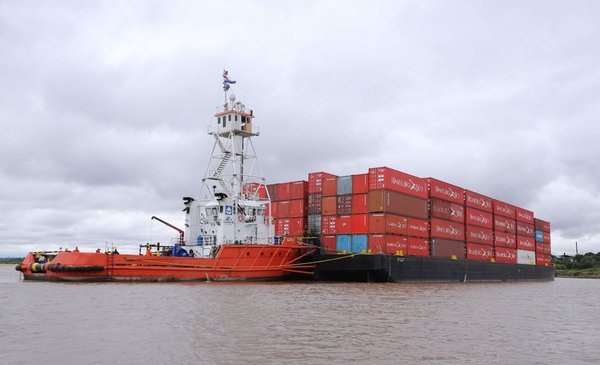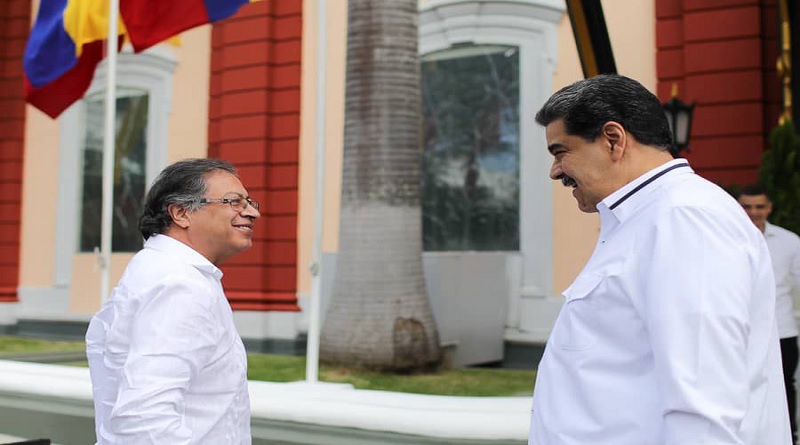The Argentine Ministry of Transport decided through a resolution at the end of November to apply the collection of a toll $1.47 per net register ton for international fluvial transport that passes through a section of the waterway. You will also charge A$1.47 for cabotage shipping from your country.
The section chosen goes from kilometer 538 and kilometer 1,240 of the Paraná River, between the port of Santa Fe and the confluence of the Paraguay River with the Paraná. All barges that navigate through that area must pay the toll to the Argentine authorities.
One of the biggest losers is Paraguay. Exporters from that country use the port transit modality: they load the merchandise in the waterway and unload in Argentine ports, Nueva Palmira or Montevideo. There is a transshipment to overseas vessels that transport it to the final export destination. Now, 98% of the Paraguayan merchandise in containers leaves through the port of Montevideo. Part of the bulk cargo (grains and iron ore) stops at Nueva Palmira.
The president of the River and Maritime Shipowners Center of Paraguay (Cafym), Stephen Dos Santoswas critical of the measure adopted by Argentina.
“It does not only affect Paraguayan cargo; but to all that travels in that section of navigation. Those affected are Paraguay, Brazil, Bolivia, Uruguay and Argentina”, he said in dialogue with The Observer. Approximately, through the Paraguay – Paraná waterway move 22 million tons of cargo. Of this total, 14 million tons are of Paraguayan merchandise, 6 million of Brazil and 2 million of Bolivian cargo.
“Merchandise in transit from Paraguay that arrives at Nueva Palmira and the port of Montevideo will have been affected by having an additional cost to cover the toll collection that Argentina is implementing,” he said. According to Cafym’s calculations, it will generate a 7% increase in freight prices, which will represent an additional cost of US$40 million per year for Paraguayan exporters and importers.
cafym
Paraguayan cargo on the waterway
The toll will be charged on the net registered ton of the vessel, which is a unit of measure that arises from a calculation of the volumetric weight of the vessel and its dimensions. It must be paid regardless of whether the ship carries cargo or not. “A tugboat and barge convoy with grains that goes to Nueva Palmira exports and generally returns empty. When he returns, he still has to pay,” explained Dos Santos.
The president of Cafym recalled that the measure began to take shape in October of last year. When the businessmen found out about the news, there were contacts with the Paraguayan Foreign Ministry. There, a bilateral meeting was coordinated with Argentine representatives that took place in November. In that meeting it was agreed to establish a period of 180 days to carry out technical analyzes on the implementation of toll collection. “That was not respected by Argentina, since on December 29 they issued the resolution,” commented Dos Santos.
The businessman argued that after that bilateral meeting, Uruguay should have requested a meeting of the Paraguay-Paraná Waterway Agreement Commission, because it had the pro tempore presidency. The Uruguayan delegation will meet on Monday the 9th to analyze the recent measure taken by the Argentine government, informed The Observer Felipe De Haedo, representative before the Commission. This meeting of national authorities will be held at the request of the Paraguayan authorities, he added.
Argentina announced that the proceeds from the toll will be used for future dredging works. “That It is absolutely unacceptable because in the waterway agreement it is clearly established that no country, unilaterally and without prior consensus with the other countries, can establish any rate, levy or tariff for the sole purpose of navigation,” he said. “Since there is no consideration for any service (the collection of the toll) it is absolutely illegal”, he complemented.
The toll has been in effect since January 1. and therefore the Paraguayan maritime shipowners are aware that at any moment they will begin to receive the invoices to pay it. There, they must transfer that cost to the cargo, which in turn will be transferred to the exporter or end customer.
For Dos Santos, the measure also harms the Argentine industry. Many shipments of grains that transit through the waterway call at Argentine ports. The final destination is the oil industry of that country. The same occurs with iron ore whose main customer is the steel sector. “By making these products more expensive, Argentina in turn is making the raw material more expensive for its own industry,” he said.







